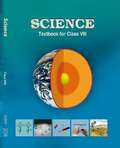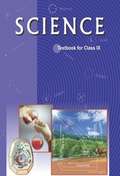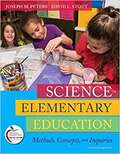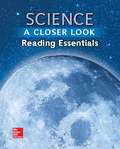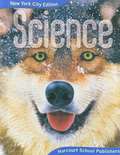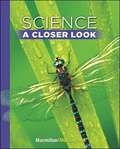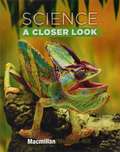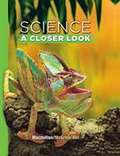- Table View
- List View
Science class 8 - JK Board
by Jammu and Kashmir State Board of School EducationDesigned for the students of Class 8, this textbook of Science covers all the topics that are outlined by the Central Board of Secondary Education (CBSE). The chapters are well covered, giving the students a clear idea about the different topics. Moreover, the important points are highlighted so that students find them easy to memorise. The colourful pictures and illustrations make the learning more interesting.
Science class 8 - NCERT - 23
by National Council of Educational Research and TrainingThe NCERT Class 8 Science textbook provides a comprehensive overview of key scientific concepts and principles designed to engage and educate students at the middle school level. Divided into several chapters covering topics such as Crop Production and Management, Microorganisms, Synthetic Fibers and Plastics, and Conservation of Plants and Animals, the textbook delves into fundamental scientific principles with clarity and depth. Through a combination of informative text, colorful illustrations, and hands-on activities, students are encouraged to develop a deeper understanding of various scientific phenomena and their real-world applications. Additionally, the textbook emphasizes critical thinking and problem-solving skills, fostering a holistic approach to scientific inquiry and exploration. With its structured curriculum and accessible language, the NCERT Class 8 Science textbook serves as an invaluable resource for students seeking to develop a strong foundation in science.
Science class 8 - RBSE Board: विज्ञान कक्षा 8 - आरबीएसई बोर्ड
by Rajasthan State Textbook BoardScience Textbook for Class 8, Education book
Science class 8 - Tamil Nadu Board
by State Council of Educational Research and TrainingThe textbook underscores the critical role of measurement in scientific inquiry and everyday life, introducing various unit systems such as FPS, CGS, and MKS, while emphasizing the International System of Units (SI). It elaborates on the seven base quantities—length, mass, time, temperature, electric current, amount of substance, and luminous intensity—and their respective SI units. The text further explains temperature as a measure of average kinetic energy and electric current as the flow of electric charges, detailing their units and measurement methods. Additionally, it covers derived quantities like plane angle and solid angle, describing their definitions and units. Through activities and practical examples, the textbook aims to deepen students' grasp of fundamental scientific concepts.
Science class 8 - Tamil Nadu Board: அறிவியல் எட்டாம் வகுப்பு
by State Council of Educational Research and Training Tamil Naduதற்போதைய வகுப்பில், அறிவியல் பாடத்தின் அனைத்து முக்கிய தலைப்புகளையும் உள்ளடக்கியதாக புது பயிலும் வழிகாட்டி வகுப்புகள் வழங்கப்பட்டுள்ளன. உடல் மற்றும் பொருளின் அடிப்படை அமைப்புகள், உயிரியல், வேதியியல் மற்றும் இயற்பியல் ஆகிய பிரிவுகளை அடிப்படையாகக் கொண்டு பாடம் முன்னெடுக்கப்படுகிறது. மாணவ/மாணவிகளுக்கான செயல்பாட்டு பரிசோதனைகள், விளக்கங்கள் மற்றும் எளிய விளக்கங்களுடன் கொடுக்கப்பட்டுள்ளன. உயிரின் வளர்ச்சி, சுற்றுச்சூழலுடன் உறவாடல் மற்றும் அறிவியல் நவீன தேசங்களின் முன்னேற்றம் ஆகியவை கற்றுக்கொள்ள முக்கியமான அம்சங்களாக இருக்கின்றன.
Science class 9 - NCERT - 23
by National Council of Educational Research and TrainingThe Class 9 Science textbook by NCERT provides a comprehensive exploration of fundamental scientific concepts. Divided into chapters covering topics like matter, motion, energy, and biology, it offers clear explanations supported by diagrams and examples. Emphasizing critical thinking and practical application, the textbook encourages students to engage in scientific inquiry and experimentation. It includes activities, experiments, and questions to reinforce learning and assess understanding. By fostering a deeper appreciation for science and its principles, the textbook equips students with the knowledge and skills necessary for further studies and real-world applications.
Science class 9 - Tamil Nadu Board
by Government of Tamil NaduThis book is developed in a holistic approach which inculcates comprehending and analytical skills. It will be helpful for the students to understand higher secondary science in a better way and to prepare for competitive exams in future. This textbook is designed in a learner centric way to trigger the thought process of students through activities and to make them excel in learning science.
Science for Children
by Marilyn FleerScience for Children introduces readers to the pedagogy of primary and early childhood science education. The book pays special attention to the three strands of science, in accordance with the Australian Curriculum. <P><P>It also uses the practice principles and learning outcomes of the national Early Years Learning Framework to present content for babies through to the transition into the Foundation year at school. Science for Children explores various approaches to teaching and learning in science. It covers inquiry approaches in detail; makes explicit links to the 5Es; critiques longstanding approaches, such as discovery approaches and a transmission approach; and explores Indigenous perspectives and a Vygotskian framework. This allows the reader to make informed choices about when to use a particular approach in primary classrooms and early childhood settings. Designed to prepare future educators for practice, Science for Children challenges students and offers practical classroom-based strategies for their science teaching careers.
Science in Elementary Education: Methods, Concepts, and Inquiries
by David Stout Joseph PetersSubstantially rewritten to focus on inquiry teaching and learning as espoused in the National Science Education Standards, the new edition of Science in Elementary Education: Methods, Concepts, and Inquiries will prepare pre-service teachers to plan, facilitate, adapt, and assess inquiry experiences consistent with today’s science classroom. It accomplishes this by implementing the 6E model of inquiry teaching, addressing the planning and needs of inquiry teaching classrooms, and describing the materials teachers need to get up and running. <p><p> This practical text includes over 350 Teaching Tips throughout and Twelve Inquiry Units that model constructivist applications, build conceptual knowledge, and provide a bank of classroom-tested lessons to use in science classrooms.
Science of the Physical Creation in Christian Perspective (2nd Edition)
by Dewitt Steele Gregory ParkerTopics covered in this text book include atmosphere, weather, seas, molecules, weathering , erosion , waves , sound, light , color and many more.
Science, Social Science class 6 - Tamil Nadu Board
by Tamil GovernmentThe Science textbook for standard six has been prepared following the guidelines given in the National Curriculum Framework 2005. The book is designed to maintain the paradigm shift from the primary General Science to branches as Physics, Chemistry, Botany and Zoology.
Science, A Closer Look, Grade 6, Reading Essentials
by McGraw-Hill EducationReading Essentials provides an ‘interactive’ reading experience to improve student comprehension of science content. It makes lesson content more accessible to struggling students and supports goals for differentiated instruction.
Science, Comprehensive Course 2
by Patricia Craig Juli Berwald Michelle Anderson John F. Bolzan Rachel ClarkNIMAC-sourced textbook
Science, New York City Edition
by Marjorie Frank Michael J. Bell Michael A. DispezioNIMAC-sourced textbook
Science, Social Science Volume 3 Term 2 class 6 - Tamil Nadu Board
by Tamil GovernmentThe Science textbook for standard six has been prepared following the guidelines given in the National Curriculum Framework 2005. The book is designed to maintain the paradigm shift from the primary General Science to branches as Physics, Chemistry, Botany and Zoology.
Science, Social Science Volume 3 Term 3 class 6 - Tamil Nadu Board
by Training State Council of Educational ResearchThe Social Science textbook for standard six of term 3 and volume 3. The book is designed to maintain the paradigm shift from the primary General Science to branches as Physics, Chemistry, Botany and Zoology.
Science: A Closer Look
by Jay K. Hackett Richard H. Vasquez Joanne MoyerScience: A Closer Look, offers students exciting and accessible standards-based lessons. Engaging activities promote curiosity and foster the development of science inquiry skills. Through a consistent and structured learning cycle, students confidently build upon their experiences to develop a lifelong understanding of science concepts.
Science: A Closer Look
by Macmillan McGraw-HillThe Grade 4 Student Edition covers units such as Living Things, Ecosystems, Matter, and Forces of Energy.

